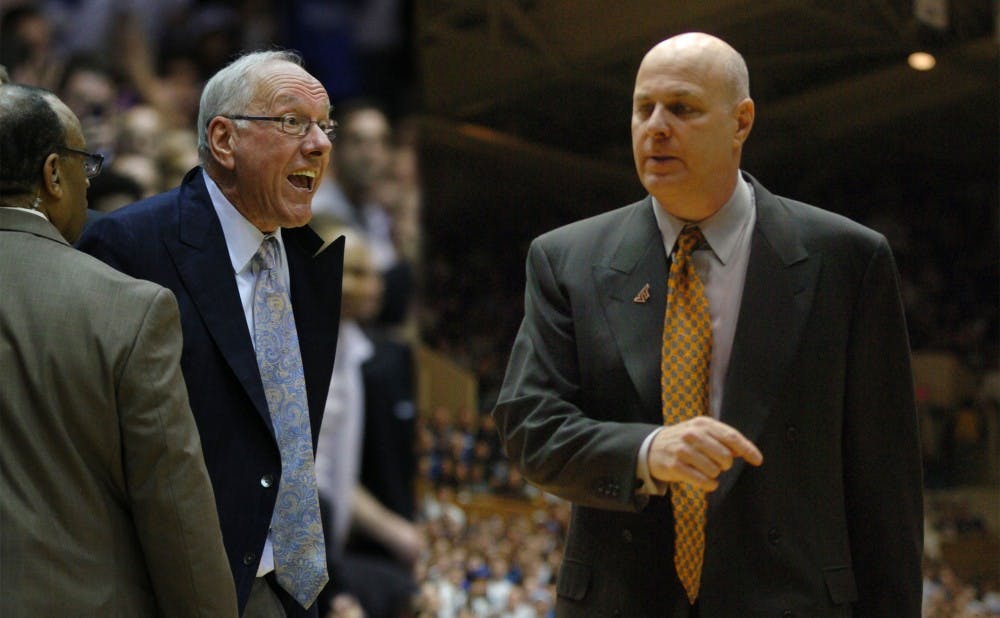In 38 seasons as the head coach of Syracuse, Jim Boeheim had never been ejected from a regular-season game until Saturday against Duke. Boeheim—a national champion, who holds the NCAA Men's Division I record for most wins all-time at one school—is no stranger to high-pressure situations.
Was the charge call on C.J. Fair that egregious? By most accounts, even if the call could have gone either way, it was far from the “worst call of the year” as Boeheim said after the game. This begs the question: Why did he lose his cool Saturday and say what he did after the game?
But Boeheim isn’t the first coach to be ejected from his first game at Cameron Indoor Stadium. Former Virginia Tech head coach and current ESPN college basketball analyst Seth Greenberg suffered the same fate in 2005, the first time he brought his Hokies to Coach K Court.
“You always regret it. You look back at those things and say, ‘What was I thinking? I wish it didn’t happen,’ but it did,” Greenberg told The Chronicle. “You’ve got to deal with it, but does the place create that? The first time especially, the feeling is the first time you go into Cameron, the perception is you’re not going to get a fair deal. That’s just the way it is. If that gets in your head, that’s almost the advantage for Duke.”
Greenberg noted that Boeheim doesn’t usually “wear at officials,” but that the stadium’s electric atmosphere—featuring two top-five teams coming off losses, having gone to overtime earlier in the year—only added to the intensity of the coaches.
More striking than Boeheim’s reaction during the game, though, were his comments afterward.
After Boeheim said that he thought the game was “tremendously well-officiated,” he added, "I just thought it was the worst call of the year, that's all. I just hate to see a game decided like that.”
When it comes down to it, Boeheim’s ejection forfeited his team’s chance at a comeback, something Fair spoke to after the game. Duke was up by two at the time with 10.4 seconds left but had hit only 7-of-17 free throws up to that point. A comeback and overtime may have been improbable, but it was certainly possible.
Yet afterward, Boeheim blamed the outcome of the game—99.6 percent of which had been played before that call—on one whistle.
“I’m not a Hall of Fame Coach so I would never even think about making that comment. That comment wouldn’t serve me well. That comment probably would’ve gotten me suspended,” Greenberg said with a laugh. “It’ll be interesting to see what the repercussions are. If Seth Greenberg said that, he might get a public reprimand. If Jim Boeheim says it, he might get a private reprimand or nothing could happen at all.”
As of now there have been no public repercussions, but I think it’s important to compare Boeheim’s comments with those delivered by Duke head coach Mike Krzyzewski after the first Syracuse game. That game, much like the one Saturday, had a controversial call in the game’s waning moments. With the Blue Devils trailing by one in overtime—after Jabari Parker and Amile Jefferson had already fouled out—Rodney Hood drove and attempted a dunk. He was hit on the arm, but no foul was called.
Like when Hood drew the charge on Fair, the call probably could have gone either way. But in Krzyzewski’s postgame press conference in Syracuse, when he was asked if he thought if it were a foul, here’s what he said:
“I’m not going to go there. This game is too good to talk about one play.”
Coach speak? Yes. But it’s the truth too. It’s the right and fair thing to say. There are countless calls throughout a game that could go either way, and, naturally, fans and coaches alike get caught up in the ones in a game’s final moments. They appear the most decisive. But to say a game was "decided like that"—as Boeheim did—discredits what happened in the previous 39:50. To say what Krzyzewski did appropriately contextualizes one controversial call in an otherwise unforgettable classic. The players—the student-athletes who have now given fans two of the greatest games in all of college basketball this season—decided most of the game.
The story shouldn’t be about the officials, but now that story overshadows the budding rivalry that will last as long as Krzyzewski and Boeheim—two of the best ever—roam the sidelines.
It usually takes a entire career to create the type of memories that Duke and Syracuse have experienced in a year. Just ask Greenberg.
“I’ve had the circle of life in Cameron,” he said. “I’ve gotten tossed, I’ve gotten beat at the buzzer, and I’ve won in overtime.”
At this rate, expect a Duke-Syracuse buzzer-beater in the ACC tournament. Whoever wins, let’s just hope we’re talking about the game when it's over.
Get The Chronicle straight to your inbox
Signup for our weekly newsletter. Cancel at any time.

